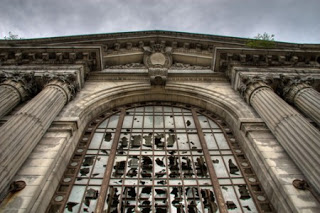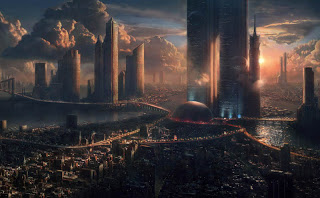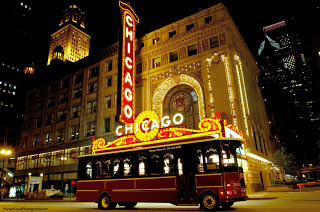The Urban Tyranny
By Daniel Greenfield
SultanKnish.Blogspot.com
Every city is by necessity a tyranny. Density
determines how people live and how they do not.
Freedom is in part inefficiency and city living is
fed by the need to achieve social efficiency.
Bloomberg's much denounced nanny state tactics are
only an extension of the same drive to maximize
social efficiency.

Bloomberg may have become the poster billionaire
for such behavior, but the majority of cities have
their own solutions to the problems of people that
come at the expense of individual freedom. The same
efficiency that compresses the maximum number of
people into an existing space is also applied to
every other area of their lives. In cities of
strangers, there is no area of life too intimate to
be examined and made more efficient.
Unlike the country, the city is its own frontier.
Its great adventure is not exploration, but
existence. The city is always changing, mutating,
falling apart and coming together under assault from
waves of new immigrants and social challenges. Its
spaces are inner spaces; whether those of the mind
of the individual on a crowded bus, the meaning of
the squiggles in a piece of abstract art or that
club hidden at the end of an old alley.
Cities are never stable. That is what makes them
exciting. Truly old cities become fossilized, but
they still always seem on the verge of being tipped
over. The city is a social breakdown in motion and
the authorities are always scrambling to apply
emergency measures to salvage it. There are always
poor people somewhere and other people on the verge
of rioting. A criminal underclass haunts its towers
and slums. And most of all there are too many
people.
Freedom is measured in terms of space, both physical
and conceptual, but in the city freedom is largely
conceptual, rather than physical. The city man and
woman are less likely to go camping than to explore
their inner psyches. With little physical space
available that is unoccupied, the urbanite retreats
to the one sanctuary where no one can trouble him.
His own mind. Despairing of physical space in his
cramped conditions, he takes refuge in the space of
his own psychic attic.
Culture flourishes in the city, but it is a culture
that is a signpost of status. Urban culture has to
work harder to be noticed among jaded appetites in
cities where the noise and bustle make attentions
harder to seize and where sensibilities are harder
to shock. Status symbols in culture take that one
step further by disrupting communications, producing
art that is illegible and requires inside knowledge
to interpretation. The escape into deeper levels of
metaphor continues the urbanite exploration of the
psyche while closing the door to the underclass to
preserve the status of the artistic cultural space.
The city is seen as the pinnacle of culture and
therefore there is nowhere else to go but deeper
inside. If the city is the endpoint of human
civilization, then its refining becomes the prime
task of that civilization.
The modern liberal would hardly exist but for the
various social improvement schemes of the city from
the early muckraking photographers taking photos of
dirty slum children playing in alleys to the massive
implementation of the modern welfare state. The
agrarian and industrial obsessions of the left have
collapsed. Only the urban obsession with the eternal
slums, now likely to be the product of government
intervention, rather than slum overcrowding,
continues.
It is no coincidence that Obama's big victories
came in the city. And it is even quite probable that
population density might be a predictor of big
government and small government voters. It isn't
that urbanites especially love government, but they
have come to accept it as a necessary evil and to
look longingly for the vaunted reformers to come and
save them from the political machines.
The lack of space, physical, economic and
structural, in a city makes the lack of freedom into
a part of the design. It is second nature to assume
that someone must administer those friction zones
because there is no alternative.
The social codes that might resolve such conflicts
elsewhere are difficult to sustain in an environment
that is always changing. Anonymity brings with it a
freedom from peer pressure and community mores, but
also eliminates the power of those things to
maintain social norms.
Urban social norms are evolved to avoid conflict.
Urbanites studiously ignore each other or maintain a
distant politeness in their interactions. Not
noticing other people is the height of good manners.
The truly civilized man is expected not to notice
uncivilized behavior. Relativism is the expected
response to any violation of human norms, but not to
violations of any element of the petty codes of
urbania. It is very well for a man to strip naked on
a train and run from car to car shouting that the
aliens are coming, but not to throw his recycling
into the trash.
The only free people in cities are eccentrics and
criminals. Eccentricity is a necessary performance
art in the face of anonymity. And criminality is
often the only way to get things done. Everyone
breaks some laws because there are too many laws and
many of them are unreasonable or unlivable. In their
own way, every urbanite is an eccentric and a
criminal. It is only a matter of scale. The best
eccentrics have features written about them in
newspapers. Less successful eccentrics occasion only
shrugs. The best criminals become legends. The rest
just spend their senior years bemoaning the new
thugs who don't seem to care about honor and are
only out for themselves.
Information is the great obsession of the city. The
urbanization of America has kept up with an
information management revolution. Telecommuting did
not touch off a second wave of suburban escapes.
Instead cities became bigger than ever.
The new mobile technologies can be used for
telecommuting, but what they do best is overcome the
sense of confining space. Compacting social
interactions into a 4 inch device has transformed
the city into a landscape of invisible connections.
Social media has achieved another descent for the
city into inner space, maintaining imaginary broad
social spaces amid the density of urban life.
The internet has become the ultimate city, a virtual
urban environment flooded with content, shocks,
amazes and confuses, while destroying sensibilities
and boundaries. It is a multicultural city
encompassing the world. And the individual cities
are also coming to seem like the internet, networks
and hubs, short-lived and purposeless, but somehow
hanging on long enough to grab some attention.
Information is the city's only reason for existence.
The industries have fled to dirtier cities in the
far east. Detroit still grinds on as carmakers
subsidized by the government subsidize a city
abandoned by its people. On the verge of bankruptcy,
Detroit looms large in the imagination as a failure,
a relic of industry whose great failure was the
inability to attract enough bright young people with
money to subsidize its army of government employees.
New York City on the other hand is a success story.
The city makes very little of any use, but it does
cater to tourists and acts as a hub of the financial
industry. It offers impressions and information as
its currency. And supplements that with culture and
education. It is no different in this than many
other cities, including London.
The new city is park brokerage and part hipster
hangout, with the two often overlapping. Outside
this charmed circle of hedge funders attending art
exhibitions is a growing permanent underclass
flowing through the gates of the city. The
relationship of that underclass to the two charmed
circles of finance and culture is that of the
barbarians at the gates of a decadent empire.

Cities are arguably ghettos. The old mechanisms for
moving workers up the ladder collapsed when
industries did. The workers who moved to the north
from the south to take advantage of those industries
became dwellers in the ghettos and they were joined
by armies of immigrants looking for opportunities,
but finding few of those outside the civil service.
The city exists to administer the city, to cater to
it and to serve it. Cities are getting bigger, but
it's not a natural increase. The very efficiency of
the city has made it a convenient place to gather
large numbers of people who need caring for. That is
explicitly the case in Detroit where plans include
making the city far smaller by demolishing parts of
it in order to be better able to care for the
people.
The modern city is a failure, but it is also the
space out of which conceptions of the ideal state
come from. Urbanites are still suckers for the
progressive dream of a global state that packs
everyone into a city as big as the world. No one
asks to what purpose. To an urbanite, the purpose of
the city is self-apparent. It is home.


